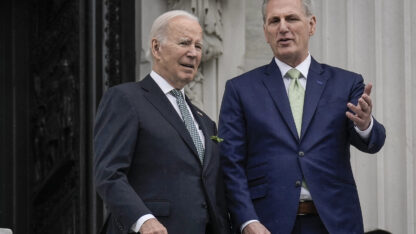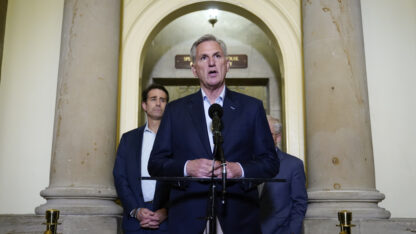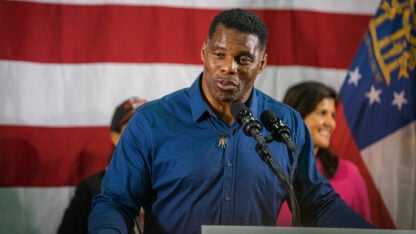President Joe Biden says he feels good about the debt ceiling and budget deal negotiated with House Speaker Kevin McCarthy as the White House and congressional leaders work to ensure its passage this week in time to lift the nation’s borrowing limit and prevent a potentially disastrous U.S. default.
Signaling the tough days still ahead, McCarthy urged skeptical colleagues to “look at where the victories are.”
The Republican speaker said Tuesday he will be sitting down and talking with lawmakers as they return to Washington from the long Memorial Day weekend.
“This is just the first step,” McCarthy said of his agreement with Biden.
In an appearance on “Fox & Friends,” he sought to shore up support amid rising opposition from conservatives in his party. Unhelpfully for Biden, he said of the Democrats, “There’s nothing in the bill for them.”
A key test was coming late Tuesday when the House Rules Committee was to consider the package and vote on sending it to the full House for a vote expected Wednesday.
Quick approval by both the House and Senate would ensure government checks will continue to go out to Social Security recipients, veterans and others. The agreement includes expanded work requirements for some food aid recipients but not as stringent as many Republicans wanted.
A number of hard right conservatives are criticizing the deal as falling short of the deep spending cuts they wanted, while liberals decry policy changes such as new work requirements for older Americans in the food aid program.
Biden spent part of the Memorial Day holiday working the phones, calling lawmakers in both parties.
“I feel very good about it,” Biden told reporters Monday. “I’ve spoken to a number of the members,” he said, among them Senate Republican leader Mitch McConnell, a past partner in big bipartisan deals who largely has been sitting this one out.
To progressive Democrats raising concerns about the package, the president had a simple message: “Talk to me.”
As lawmakers size up the 99-page bill, few are expected to be fully satisfied with the final product. But Biden, a Democrat, and McCarthy, a Republican, are counting on pulling majority support from the political center, a rarity in divided Washington, to join in voting to prevent a federal default.
Wall Street re-opening Tuesday wasn’t quite sure. Stock prices were mixed at midday. U.S. markets had been closed when the deal was struck over the weekend.
McCarthy acknowledged the hard-fought compromise with Biden will not be “100% of what everybody wants” as he leads a slim House majority powered by hard-right conservatives.
Facing potential blowback from his conservative ranks, the Republican speaker will have to rely on upwards of half the House Democrats and half the House Republicans to push the debt ceiling package to passage.
Overall, the package is a tradeoff that would impose some spending reductions for the next two years along with a suspension of the debt limit into January 2025, pushing the volatile political issue past the next presidential election. Raising the debt limit, now $31 trillion, would allow Treasury to continue borrowing to pay the nation’s already incurred bills.
Additionally, policy issues are raising the most objections from lawmakers.
Liberal lawmakers fought hard but were unable to stop new work requirements for people 50 to 54 who receive government food assistance and are otherwise able-bodied without dependents. The Republicans demanded the bolstered work requirements as part of the deal, but some say the changes to the food stamp program are not enough.
The Republicans were also pushing to beef up work requirements for health care and other aid; Biden refused to go along on those.
Questions are also being raised about an unexpected provision that essentially gives congressional approval to the Mountain Valley Pipeline, a natural gas project important to Sen. Joe Manchin, D-W.Va., that many Democrats and others oppose as unhelpful in fighting climate change.
Manchin on Tuesday touted the inclusion of the Mountain Valley Pipeline project saying it’s something “we know we need.”
Asked on West Virginia radio if Democrats would have still enough support to help pass the package, he said he thinks so. “All parties that were negotiating agreed that Mountain Valley Pipeline is in the national interest,” he said.
But the top Democrat on the House Natural Resources committee Rep. Raul Grijalva of Arizona said including the pipeline provision was “disturbing and profoundly disappointing.”
At the same time, conservative Republicans including those from the House Freedom Caucus say the budget slashing does not go nearly far enough to have their support.
“No one claiming to be a conservative could justify a YES vote,” tweeted Rep. Bob Good, R-Va.
This “deal” is insanity,” said Rep. Ralph Norman, R-S.C. “Not gonna vote to bankrupt our country.”
All told the package would hold spending essentially flat for the coming year, while allowing increases for military and veterans accounts. It would cap growth at 1% for 2025.
The House Rules Committee has three members from the influential Freedom Caucus who may very well try to block the package from advancing, forcing McCarthy to rely on the Democrats on the panel to ensure the bill can be sent to the House floor.
The House aims to vote Wednesday and send the bill to the Senate, where Majority Leader Chuck Schumer along with McConnell are working for a quick passage by week’s end.
Senators, who have remained largely on the sidelines during much of the negotiations between the president and the House speaker, began inserting themselves more forcefully into the debate.
Some senators are insisting on amendments to reshape the package from both the left and right flanks. That could require time-consuming debates that delay final approval of the deal.
Democratic Sen. Tim Kaine of Virginia is “extremely disappointed” by the provision greenlighting the controversial Mountain Valley Pipeline, plans to file an amendment to remove the provision from the package.
Republican Sen. Lindsey Graham of South Carolina complained that the military spending increases are not enough. “I will use all powers available to me in the Senate to have amendment votes to undo this catastrophe for defense,” he tweeted.
But making any changes to the package at this stage seems highly unlikely with so little time to spare. Congress and the White House are racing to meet the Monday deadline now less than a week away. That’s when Treasury Secretary Janet Yellen has said the U.S. would run short of cash and face an unprecedented debt default without action.
A default would almost certainly crush the U.S. economy and spill over around the globe, as the world’s reliance on the stability of the American dollar and the country’s leadership fall into question.








